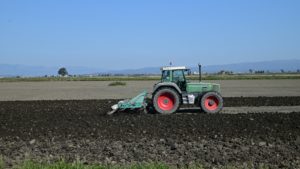Stages in a Replant: Plowing
NOTE: THIS BLOG POST IS PART 1 IN A FIVE-PART SERIES ON THE STAGES OF A REPLANT.
Potential Change on the Horizon
There is something to be said for churches who have chosen the Replant option. For churches who are ready to change, it requires boldness and energy mixed with a soft and willing heart.
Replanting has a high risk, but a high reward. It requires patience, stability, regularity, prolonged unity, and a leadership team that is “all in.” While there exists the possibility of conflict, frustration, and spiritual warfare, the end result of a replant can be a new, vibrant church that is focused on discipleship, mission, and community.
There are surface changes we may do in Replant, but there are some underlying, primary things that give a structure to Replanting. In his work with NAMB, Bob has done a great job in developing the four stages of a Replant. The focus on this blog is the first stage: Plowing.
Who Will Give the Growth?
In 1 Corinthians 3:5-9, Paul gives an agricultural illustration of the result of a fruitful ministry:
“What then is Apollos? What is Paul? Servants through whom you believed, as the Lord assigned to each. I planted, Apollos watered, but God gave the growth. So neither he who plants nor he who waters is anything, but only God who gives the growth. He who plants and he who waters are one, and each will receive his wages according to this labor. For we are God’s fellow workers. You are God’s field, God’s building.”
When it comes to the work of ministry, we may do all we can to implement strategies, ideas, and plant seeds. We may have others that come along with us and help water those seeds. But at the end of the day, God is the one who causes the growth. If this is threatening rather than reassuring, you may need to pause for a moment and reflect. See if there is any pride in you. The growth of a church does not depend on your clever tactics. It depends on God. This should be a comforting thought, as we realize that God alone can bring new life.
Fellow Workers, Plowing in God’s Field
Paul still recognizes that even though this is God’s field, we are his fellow workers. We still have a part to play! But our role is primarily in preparing and creating space for God to work. In the first stage of Replanting, we find ourselves Plowing. In order for new Gospel seeds to take root—the hard ground must be plowed, broken up and turned over.
Plowing is the work of God in preparing the ground through prayer and preaching. When we pray, we are expressing our dependence on God. When God’s people pray, God moves! When we preach the Gospel with the power and conviction of the Holy Spirit, God works in the hearts of His people. During this first stage, we are mainly focusing our church spiritually by prayer and faithful preaching of the word.

There are also some practical ways that we can “prepare the ground” and create space for God to move. Outside of regular prayer and preaching, what does the work of “plowing” look like in a Church Replant?
- The Cessation of the “Well Worn”: Plowing breaks up what was in order to do what’s next. Sometimes this takes place by rethinking a favorite program, a music style, a favorite fellowship, or a message on the sign outside. In seeking to find what’s next—the congregation, Pastor and leaders must pray and plan together, relying on God to lead the way.
- Disruptive Force: as a plow breaks into the ground it cuts, separates, lifts and turns over. Hard ground is transformed more and more into soft earth as the steel edge of the plow repetitively breaks into the ground. God’s word regularly and rightly proclaimed while empowered by the Holy Spirit, is the disruptive force that breaks into the hearts of people. The Word of God proclaimed in the power of the Spirit will serve to disrupt and dislodge the hard ground covering fertile soil.
- Persistent Plodding: The hard places won’t be softened with one message, one prayer, or one strategic action list. Plowing is the regular, constant work of prayer and preaching. It takes faithfulness and consistency, because it takes time for hearts to be softened.
- A Christ Centered Commitment: Jesus admonished his followers by saying that anyone who put their hand to the plow and then quit—is not worthy of his kingdom. Revitalization and Replanting Pastors know that turnarounds are never short—many experts believe it takes between 5-7 years for a once in decline or nearly dead church to come back to life.
John and the 70
The work of plowing takes selfless individuals who are passionate about the gospel. When I think of a Biblical Example of “Plowing,” I can’t help but think of John the Baptist. When John was born of Elizabeth and Zechariah, Zechariah prophesied, saying, “And you, child, will be called the prophet of the Most High; for you will go before the Lord to prepare his ways, to give knowledge of salvation to his people in the forgiveness of their sin…” (Luke 1:76-77).
John the Baptist came preaching repentance and preparing the way of the Lord, by “proclaiming a baptism of repentance for the forgiveness of sin,” (Luke 3:3). He was doing the work of plowing. Through years of silence and awaiting the promised Messiah, the ground had become hard and difficult. So much so, that many were unwilling to believe that Christ was the Messiah. But many hearts were prepared and ready to follow Jesus due to John’s work in ministry.
Lastly, the work of plowing takes a team. In Luke 10:1-3, Jesus sets his face toward Jerusalem. He appoints 70 of his followers (or 72 depending on translation) to go into every town and village where he is about to go. Their message was to proclaim that “the kingdom of God has come near,” (v. 9, 11). The 70 appointed followers were sent out by Christ to plow the ground, to prepare the way of the Lord.

Before they were sent out to all the towns and villages, he made a statement that gives life to our agricultural illustration: “The harvest is plentiful, but the laborers are few. Therefore pray earnestly to the Lord of the harvest to send out laborers into his harvest. Go your way; behold, I am sending you out as lambs in the midst of wolves.”
I truly believe that the work of Replanting involves a right understanding of our mission field. Do we believe that the harvest is plentiful around us? What God wants us to do in this work is to create opportunities for Him to work on people’s hearts. In doing so, we will be preparing the way of the Lord.
For more information on the work of plowing, see Bob Bickford’s article on NAMB’s website or listen to Ep. 163 of the Replant Bootcamp Podcast. While resources on prayer and preaching are abundant, here are a few of my personal favorites: Faithful Preaching, The Supremacy of God in Preaching, Preaching by the Book, Preaching for God’s Glory, Power Through Prayer, Prayer, and Prayer.
If you think your church is in danger of closing, take this church health assessment. This self-assessment is meant to help assist you in determining the current state of your local church. Another way to get started is by taking an introductory course that will help anyone understand what church replanting is and how it provides hope for dying churches.

